Summer




As you know, the Summer Term at St Joseph’s is always a busy and productive one. Whilst focused importantly on public examinations for Senior School students, the term is also packed full of enjoyable occasions both on and off campus for students of all ages.
As we prepare for September during the Summer break, we also look forward to:
• The opening of our new Prep Performing Arts Centre. This will also create additional space for our EYFS children in the Prep School
• Installation of a state-of-the art astro and refurbishment of our netball courts
• Re-configuration of our boarding houses to create Junior Boarding in Goldrood House and Senior Boarding in The Mews
It is always a pleasure to welcome OBs back to the school, but we do tend to put them to work! Conservationist Nick Bubb OB, pictured on the front cover was guest of honour at our Senior Prizegiving. And Tabitha Debenham OB, pictured with her mother, Jenny, the College nurse, on P5, performed with her group, The Three Chordettes, at our VE 80 commemoration evening to much acclaim from parents, staff and students.
Also featured in this issue are OB Solomon Atkinson-Padmore, aspiring writer, on the honing of his craft, and a scrapbook of photos sent in by the daughter of deceased OB. She came to see for herself where the images taken.
Wherever you are and whatever you are doing, I wish you a glorious summer and look forward as ever to hearing your news.
A final note… we look forward to welcoming many of you back on campus for our 39th annual Rugby Festival over the weekend of Friday 17 - Sunday 19 October 2025. Mrs Danielle Clarke
Principal
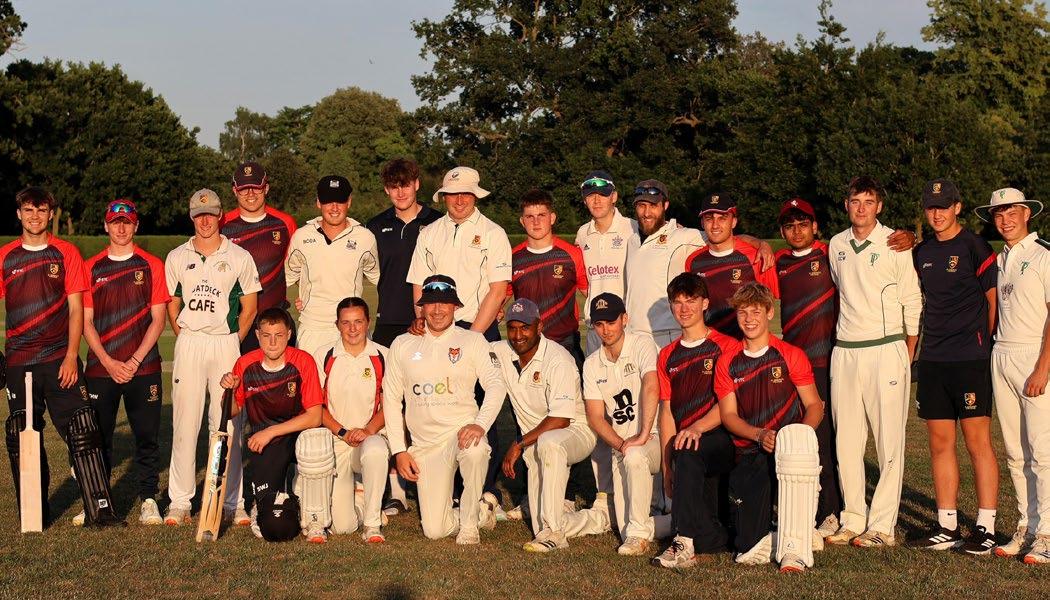
The green and leafy St Joseph’s campus made a splendid early evening setting for the annual OB cricket match against the school. The 20-over game was closely contested, with Isaac Toombs OB achieving a half century and retiring Head Boy Olly Edwards responding with 68 for the school. Year 11 student James secured two wickets, as did Kyle Tanner for the OBs. It was to be the OBs’ day; they finished on 216 for 3. St Joseph’s fought hard but ended on 180 for 6.
A bar, a balmy evening and a wonderfully entertaining game… We were a little disappointed by the number of spectators. Do please let us know what we should do differently next year so we can share the event more widely obs@stjos.co.uk
St Joseph’s College beat MCC in the first home game of the season, a first victory over Marylebone in 10 years. The day was made even more memorable by the return of Nick Curran OB, current MCC player.
Before the game, Mr Ben Parker, Head of Cricket, presented Alex Bush (U6) with a cap for his century against Langley School last year. Players scoring centuries or taking five wickets for the 1st XI are capped by long-standing College tradition.


Following the success of our D-Day 80 commemoration in June 2024, St Joseph’s College felt it was fitting to mark Victory in Europe Day, which the landings eventually led to. And St Jo’s did so in style.
‘This was our opportunity to bring the St Joseph’s College community together and to say thank you to the “golden” generation who won us the freedom which we enjoy today,’ said Mr Cinnamond, Deputy Principal.
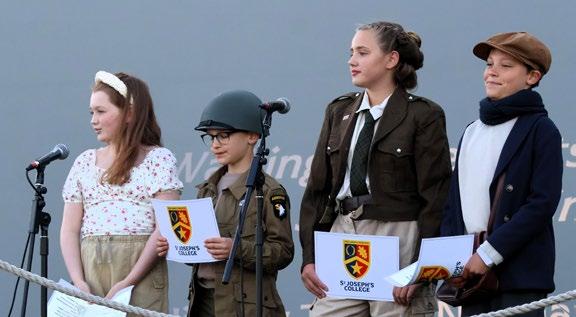

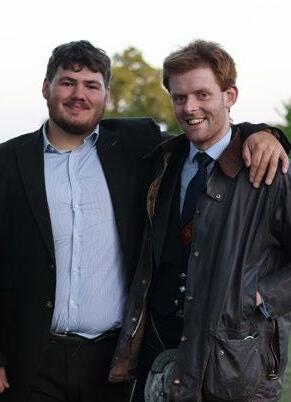

Opened by Chair of Governors, Mr Perry Glading, the evening celebrated past sacrifice and current peace. In readings, songs and music, the joy and relief of 1945 was recreated by students of all ages, by staff and by Old Birkfeldians, who returned to add their own tributes. Songs popular with the Forces and on the Home Front rang out across South Park.
Our Prep Junior Choir brought added poignancy. Marching in unison and dressed as evacuees, Land Girls, soldiers and nurses, they sang a medley of tunes. Senior students Grace (Y9) and Oscar (Y10) gave outstanding renditions of ‘Wish Me Luck’ and ‘A Nightingale Sang in Berkeley Square’ respectively. Grace later teamed up with the master of ceremonies, Dr Briege Rice, to perform the History teacher’s own composition, ‘Shores of Normandy.’
The Prep and Senior Vocal Ensemble came right up to date with a song highlighting the ongoing sacrifice of Service families, ‘Wherever You Are’, the Military Wives’ Choir Platinum-winning anthem. Returning students adding their special talents to the evening included Bella Ross OB, who sang ‘Smile’, former Deputy Head Girl Anna SimpsonJacobs OB, who sang ‘Somewhere Over the Rainbow’ in duet with Acting Director of Music, Mrs Barker, and Tabitha Debenham OB. Fortunately for us all,
Tabitha has gone on to be a member of The Three Chordettes, a harmony trio specialising in the mid-century era.
The stylish Chordettes sang two sets of period perfect songs, braving the cold in vintage swing dresses on an evening when Forties furs would have been appreciated.
Poems were recited, including ‘The Return’, written by a St Joseph’s College student in 1945. It was read by Luca (Y4), and Jensen, Isobel & Felicity (all Y6). Ademide& Alex (both Y11) also spoke, and Holly (Y7) delivered an excerpt from George VI’s VE Day speech.
Playing an active part in the event, too, was Mrs Wong, St Jo’s new Director of Music, who will be taking up the post in September.
Dr Rice and Mr Cinnamond set the event in context, before the audience joined former Head Boy Wilfred Kemsley OB in the hymn, ‘I Vow to Thee, My Country’. The solemn mood was enhanced by a Piper’s Tribute, played by another Old Birkfeldian, Euan Chalmers. This was followed by the lighting of the beacon at 9.15pm, as similar fires were struck across the country. A joyful burst of fireworks brought the commemoration to a close.
A life of adventure — from schoolboy rugby to wildlife conservation, via the Southern Ocean.
Q: Nick, take us back to the beginning—how did you end up at St Joseph’s and what was life like in those early years?
I was born in Bristol but we moved to Suffolk in 1984 when I was six, as my father had taken a job as Port Master at the Port of Felixstowe. After a short time at a local primary school, my parents realised I was going to need a bit more structure and encouragement academically and I was already showing signs of being sport-obsessed! St Joseph’s offered both the academic grounding and amazing sporting opportunities, so it became the obvious choice.
In those days, the junior school was based at Oak Hill. I joined what was fast becoming a very sporty year group and quickly slotted into the rugby scene. The famous red and white jersey inevitably became a huge part of my identity for the next 11 years. Alongside rugby, sailing became a big part of my life too. We lived in Woodbridge and I spent a lot of time at the Deben Yacht Club, racing competitively from a young age.
Q: Rugby seemed to be a constant throughout your school life—what role did it play?
It was huge. Rugby gave structure to the school year, a real sense of camaraderie and instilled a great work ethic in most of us! We certainly all had a massive amount of pride in representing the school. I played in the back row and was a solid team player, without being stand out. We had great coaches and facilities, and a strong year group. I remember some brilliant matches, but also the pressure that came with being in such a competitive environment. Around the age of 15, I hit a plateau physically. I stopped growing and found it hard to compete. That was tough and eventually I stepped away from the sport entirely and

focused more on sailing. But then, at the start of Upper Sixth, an injury crisis led to me being drafted into the 2nd XV. I’d stayed fit, had finally grown again and it all came back. A couple of games later and I was in the 1st XV and wearing the number 7 shirt again. That season we had a great run in the Daily Mail Trophy and were even featured in Rugby World as ‘Team of the Month’.
Those experiences - both the highs and the setbacks - taught me a huge amount. I realise now that I was learning how to cope with pressure, how to work within a team, and how to stay resilient even when things weren’t going my way. Crucially, being ready to take opportunities when they come my way, has always been central any success
I’ve had along the way.
After a long hiatus, I actually started playing rugby again in the Hampshire leagues in my early 30s and went all the way through to my 40s, including an appearance at the Old Birkfeldians rugby match one year!
Q: Where did life take you after school?
I went to the University of Exeter to study engineering. I scraped in with decent enough A-levels, but sport, especially sailing, remained the main focus. I ended up graduating in 2001 with a 2:2 but as a British Universities Dinghy Sailing Champion!
Over the next decade, I pursued a career as a professional sailor, whilst also working as a composites engineer. There were plenty of good times along the way but competing in the Volvo
Ocean Race in 2008/09, and several solo transatlantic yacht races, really stand out when I look back. I suppose another obvious highlight was back in 2005 and the HSBC Oryx Quest. This was my first time down in the Southern Ocean amongst the icebergs and after 74 days at sea, I became one of the youngest people to ever race non-stop around the world.
Q: How did your sailing career evolve into conservation work? The big turning point came in 2012/13, when I skippered the Shackleton Epic, an expedition that retraced Ernest Shackleton’s historic small boat journey from Antarctica to South Georgia. It was part of a Discovery Channel documentary looking at climate change over the 100 years since and really opened my eyes to the natural world. It also made me think more seriously about the positive impact I wanted my life to have.
During the expedition we were fundraising for Fauna & Flora International (FFI) and I became an ambassador, before taking up a full-time role as their Business Development Director. I stayed for over a decade. My work was mainly focused on building partnerships and fundraising for FFI’s global conservation programme. Fortunately, I also got to lead expeditions all over the world to their numerous projects sites and spent a fair bit of time with FFI’s Vice President, Sir David Attenborough.

Q: And now you’re leading Tusk—tell us about that.
Yes, I joined Tusk as Chief Executive after leaving FFI at the end of 2023. Tusk is a wildlife conservation organisation with a long history of advancing innovation in African conservation. We’re predominantly focussed on empowering local communities and connecting global partners, to protect Africa’s unique and endangered wildlife and natural habitats. This year I think we’re supporting 79 projects across 26 African countries. My role brings together a lot of my skills and experiences and I feel incredibly lucky to be doing it.

Q: You’ve also had some major personal adventures, including sailing with your family. That’s right. In 2022, I worked part-time for FFI and we sailed as a family from the UK to New Zealand on our 40 ft catamaran. Across the Atlantic, through the Caribbean and the Panama Canal, and into the South Pacific. Too many highlights to list but the Galapagos, French Polynesia and Fiji would certainly be up there. Along the way, we visited several of FFI’s conservation projects and spent time with remote island communities on the front line of climate change. It was a life-changing experience, not just for me but for our whole family.
When ashore, I’ve tried to keep myself fit and healthy over the years with several ultra marathons, Ironmans and long-distance bikepacking events but there’s no doubt my body is struggling to keep up with my ambition, so I’m slowly turning my focus elsewhere. I actually stood as a Green Party candidate in the 2019 General Election, having been a Conservative Town Councillor for the four years previously.
Q: Looking back, what impact did your school years have on your life and career?
They laid the foundation for everything. St Joseph’s gave me lifelong friendships, a love of sport, a strong work ethic, and an appreciation for nature that’s shaped the way I see the world. In some ways I was a bit of a late bloomer but the values I picked up at school, discipline, teamwork, resilience, have stayed with me through every phase of life.
Now that I have two boys of my own, I find myself thinking more critically about what makes a good school. At the end of the day, as a parent you just want your children to be happy but watching them play rugby and go sailing brings back so many good memories for me. I realise now, how grateful I am for the role St Joseph’s played in all of this for me.
A group of former Jesus and Mary School students held a happy reunion at The Forge Kitchen in Ipswich. The trio pictured are Annabelle Ryan, Becky nee Cross and Catherine Tierney. Annabelle and Cat both came to St Joseph’s for Sixth Form. Cheers, ladies. We are told the class of 1992 is also reuniting this summer.


We have been informed of the death of Conrad Meinel OB by his school friend Patrick Atkinson. Conrad joined St Joseph’s College as a boarder in 1950, and was a tall, happy-go-lucky boy. He lived in King’s Lynn and later in Prague, Czech Republic.
Patrick recalled, ‘I remember Conrad used to ride horses and he looked after a black one called Hunter. When the horses needed shoeing, we used to ride them into Ipswich, to the farrier, which was quite near Ipswich Football stadium. Conrad cared for Hunter and the one I looked after was Beauty.’
After leaving the school he went into his family business, producing catgut, Meinel is a famous name, particularly among violinists. Produced from the dried intestines of animals, especially sheep – not cats! - catgut is still used by some classical musicians and in surgical procedures, but has largely been replaced by synthetic materials.


It has been 10 years since I left St Jo’s, and it’s been quite the journey. Looking back has felt like being whiplashed between achievement and self-doubt, something that I’ve learnt is quite common for those of us trying to turn their craft into their profession. I’ve titled this article the “Story so far” because despite all the ways in which I’ve grown, I still feel like my journey is just getting started. In this article, then, I’d like to share three things that I’ve learnt to


appreciate on this journey. If you’re in the midst of a creative path yourself, then I hope this article will be of both use and encouragement to you; if not, then I hope that it gives you an insight into this world.
I think that being a St Jo’s old boy will mean something slightly different for everyone you ask. And yet, for those who choose to engage with it, there is a recognisable shared identity that often comes with it, a ‘you’ll know it when you see it’ kind of thing.
For me, I’d say the ethos and values the school tried to instil in us are undeniably Christian in origin. Respect, tenacity and love for others. It was a way to live, and looking back, I can recognise how I internalised this approach, carrying this identity as I stepped into the working world.
I studied BA Creative & Professional Writing in London, where I developed my craft, industry knowledge, and took my first steps towards what I naively thought was the straightforward path to becoming a professional writer. I explored journalism, publishing and digital marketing as career options, but found none particularly inspiring compared to pure authorship. I understood that the path to authorship is particularly fraught, with writers seemingly having minimal control over when or even if their works become recognised, let alone financially viable! Like actors, I recognised that this path usually requires working a second part-time job to support yourself between gigs, or more realistically, an unrelated
full-time job whilst your creative pursuits are squeezed into any free moment you have.
Looking back at this moment, something I am proud of is that I trusted in my ambitions. I knew what I wanted and decided to make it a priority, knowing that taking another path would leave me living with regret for not trying. Besides, this approach wasn’t without famous merit; James Cameron worked as a lorry driver, pulling over to pen script ideas before breaking into the film industry. Stephen King worked as a janitor and English teacher before writing Carrie, and Harrison Ford worked as a carpenter until he was offered roles with enough consistency to support his family.
So, with a mixture of courage, enthusiasm and naivety, I set course to make this a reality. I was confident that whatever job I found myself in, everything would figure itself out, so long as I remembered to make my craft the priority.
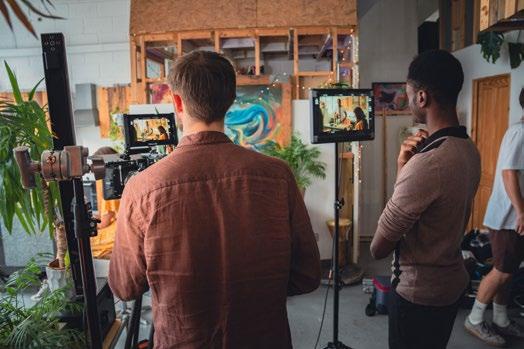
Over the next few years I would have several adventures, including, in no particular order: digital copywriting, retail, care, a charity grad scheme, surviving a global pandemic and almost joining the Army.
I call them adventures now, but thinking back, it felt more like stumbling through a jungle, desperate to find the ‘right’ path. As the years rolled on, I began to feel that heavy, stomach-churning mixture of regret, frustration and anxiety. I had forgotten what I was doing and why I was doing it. I was lost. I had fallen straight into the same trap I was so confident I would avoid after graduating. I had allowed myself to stop prioritising my craft. I had stopped writing.
It happened slowly, over the years I hadn’t even realised that it wasn’t a priority anymore, or how feeling lost had become so normal.
I think a lot of people see being creative as easy. How many times have you heard someone say ‘Yeah, I’ve got a book in me’? Because in a sense, they’re right. Practising your craft is the easy part, the hard part is the lesson I was having to learn for the second time.
Unless you prioritise your craft, you won’t protect time for it, and the responsibilities and demands of being an adult will fill it up instead. I could have spent that time producing projects, developing my writing, submitting to publications and agents. But instead, I just very slowly stopped finding time for it. Looking back now, the irony is almost funny. I knew exactly what would make me feel fulfilled, but didn’t trust myself to prioritise it. I can’t remember what exactly refocused me. But at some point, whilst working the night shift in the warehouse of a supermarket chain I now refuse to shop at, a decision was made. I would reformat my life into a form that prioritised my goals. I left for London once again to pursue an MA Film Production programme, intent on using it as a launch platform and fresh start for my life 2.0
Respecting others is a phrase that I think is overused. Every institution and employer wants to be able to promise that it respects you, even when it doesn’t. How many insincere emails, political speeches or job descriptions have you had to swallow alongside a pinch of salt? So, with this in mind, what do I mean when I say that my respect for others has been a massive benefit to my career? During my time at St Jo’s, respect for others was also highly promoted, with the phrase ‘Love the Lord your God with all your heart, and love your neighbour as yourself’ often being cited. But if you look closer, you’ll begin to see how this version of respect is both distinctive and superior to how the phrase is often thrown around in wider society. This ‘golden’ verse is paraphrased from Mark 12, and is seemingly quite a simple call to treat others the way you’d like to be. However, I think that it’s far more nuanced and insightful than that. Consider the order of it. We’re commanded to first love God. And what does loving God look like? Looking elsewhere in the Bible shows us that loving God is reciprocal, it’s a relationship, and requires acknowledging that a perfect God loves you, his imperfect creation, unconditionally. See where this is going? This is the context in which we’re commanded to love our neighbours. Imagine how different loving your neighbour would look like, without first understanding this relationship? After completing my MA I found work as a freelance videographer and crew member on several independent film productions (whilst also continuing to write!) I already knew that careers in film have a reputation for being fiercely interpersonal and relational, but this experience
quickly showed me the extent of it.
A combination of interpersonal skills, and being on the right side of someone at the right time, was just as, if not more effective, at making opportunities for me than merit. An environment that I also observed can easily breed insincerity.
I’ve worked with people who were pleasant when they needed something from me, and all but looked down their noses at me otherwise. I’ve seen bad behaviour being ignored so that people aren’t labelled as ‘difficult’, and perhaps most concerningly, I’ve felt tempted to parrot this same behaviour.
Going back to that relationship. How natural is it to want to respect others when you already know your value before God? On the other hand, if you’re someone who feels small, unworthy or frustrated, how natural is it to then project that onto others?
Don’t get me wrong, I’m no perpetual ray of sunshine. But I do think that my time at St Jo’s helped to develop a healthy and genuine love and respect for all people. Something which often stands out in these environments. I have been invited for repeated work because of my relationships with people. I have gotten help and favours on portfolio projects because of my relationships with people. And I don’t think this can be faked either. People tend to smell insincerity, but if you have true respect for others, then that is also noticed, and will create opportunities without you needing to be anybody other than yourself.
3: How to Measure ‘Success’
Career progression in creative fields, or at least my fields, often feels like a balancing act between the necessities of earning a living and your creative ambitions.
Who’s more successful, an actor who forgoes prestigious roles to be attached to more creatively fulfilling projects, or an author who compromises on their story’s vision to ensure more copies sold?
Is a crew member who bartends between gigs more or less successful than someone who gets fed up with the balancing act and pursues a non-creative career?
What about the painter of miniatures who swapped commissions for a retail job once his girlfriend got pregnant? Was starting a family a success or a failure? Because all of these examples are based on real people I’ve met on my journey so far.
The lesson you’re expecting here is to goal-set, right? Pick a direction and let that guide your decision-making and measurement of success? Well, you’d be right, but I’d add two caveats to that.
Expect your journey to that goal to be anything but linear, and avoid comparison.
Perception is a key aspect in determining whether you get work, and creative professionals are often
encouraged to present as constantly in-demand and working on creative projects.
You probably won’t see that actor posting social media updates about the day-job he works between acting gigs, the thousands of rejections that preceded the author’s post about publication, or realise that the artist’s latest piece was just for themselves, rather than on commission.
This is not to say that these people aren’t successful; in fact, I’d say that they are all successful, since they are all practising their craft and pursuing their creative goals. The lesson here is to remember, so long as you know what your goals are, and are pursuing them, then what have you failed?
Recently, I had the pleasure of meeting up with some friends from my school days. Only myself and one other were still actively pursuing creative goals.
He, an aspiring professional dancer, had, like me, spent the last 10 years doing a variety of things, only to now be working within Royal Mail whilst getting back into the swing of pursuing dance auditions. Going into this reunion, I was surprisingly apprehensive. In the years since we had last met, I had hoped to have achieved more, and was paranoid about not being able to report more ‘successes’. But actually, I’ve appreciated since just how unhelpful a mind-set this is.
Ignoring how social media can distort our sense of normal. Why did I even care? What’s more important, appearances, or your own goals? This lesson isn’t anything new, but it’s been increasingly relevant to me even now, and I hope that I can encourage you to free yourself of the stress of constant comparison.
I hope that you’ve enjoyed reading about my story so far, and that it’s been some combination of inspiring and informative. As the title suggests, after 10 years I do feel like I’m just getting started, and I’m looking forward to more adventures ahead.


‘They also serve who only stand and wait…’
June 1951 saw the staging of Ipswich Pageant, which had a dual purpose: it was part of the national Festival of Britain celebrations and it also commemorated the granting of the town’s first Charter by King John 750 years earlier in 1200. The pageant was staged in the ‘natural amphitheatre’ of Christchurch Park and was written by historian and playwright Hugh Ross Williamson, whose Gunpowder, Treason and Plot was concurrently playing at Ipswich Arts Theatre. Christchurch Park had also been the venue for the hugely popular Wolsey Pageant in 1930 and like it, the 1951 show was largely the work of the town council.
During the first half of the 20th century the town’s population grew significantly, rising to 105,000 by 1951. Prof Peter R. Odell wrote that Ipswich had benefitted from a strong and ‘pro-active’ local government. It was designated as a County Borough in 1888 and was ‘seriously’ involved in late nineteenth-century municipal socialism. It invested strongly in the port, in public health facilities (such as water supply and sewerage), in gas and electricity, and in education and culture—not to mention the construction of a set of worthy civic buildings, including the Town Hall, the Corn Exchange, libraries and museums.
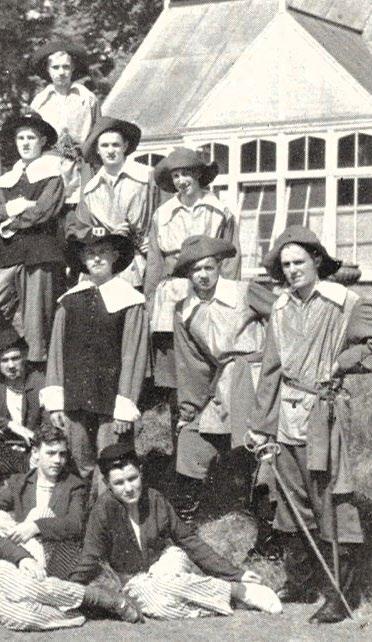
By the inter-war period there were also important public sector investments in entertainment and service facilities—of which the Wolsey Pageant could be viewed as one example. However, between 1945 and 1951, Ipswich, like many other towns and cities, suffered the blow of the loss of its traditional municipal enterprises as the Labour government nationalised the gas, water and electricity industries and, according to Odell, ‘effectively diminished the town’s municipal pride.’
The 1951 pageant was opened by R.R. Stokes, the Lord Privy Seal and Labour MP for Ipswich. He told the crowd that the ‘doubting Thomases’ who suggested the Festival of Britain was a waste of money should remember both the tangible and spiritual benefits arising from it. For Stokes, an ‘ex-tradesman’, as he put it, the Festival would
both inform visitors about what Britain was selling, as well as remind the British themselves of their ‘historical foundations and of the great achievements we had brought about as a result of the work of our ancestors.’
But the 1951 pageant appeared to have been something of a burden on the social scene of Ipswich. The Ipswich Evening Star described the mood - ‘during the months of planning there has been more than one moment when mild despair gloomed the horizon.’
Over the eight performances from June 9 to June 16, 13,000 people saw the pageant, around half the number who had crowded in to see the Wolsey Pageant, at a time when the population was considerably smaller.
But if some considered the pageant anachronistic - one letter writer said the 750th anniversary would have been better marked by the installation of efficient sewage disposal works for the town –there was also praise, if somewhat faint, for the ‘sensible, workmanlike’ script, bright costumes, smuggler scene and the enthusiasm and patience of the producer.
Even the account of the pageant in St Joseph’s school magazine of Summer 1951 is somewhat barbed. It begins ‘In response to a desperate appeal from Mr J.T. Hill, Chief Education Officer, some 50 boys of the Upper School volunteered for crowd parts in the pageant.’
It goes on: ‘They were allotted parts in the Mock Trial scene as drunken sailors – and it is remarkable how easily and naturally they assumed the manner; in the Restoration scene others appeared as Puritans, Roundhead soldiers or Cavaliers; and in the Nelson scene our drunks of earlier on had sobered into the sailors of whom England expected…
‘On the religious side we were represented by a Crucifier and attendants and schoolmasters. V. Peniston-Bird, as a flunkey, was proud to have the only speaking part, informing the Nelson guests and the crowd at large that supper was served.
‘A word of appreciation is here due to Matron and Mrs Early for the considerable amount of work they put in to the making of costumes.’

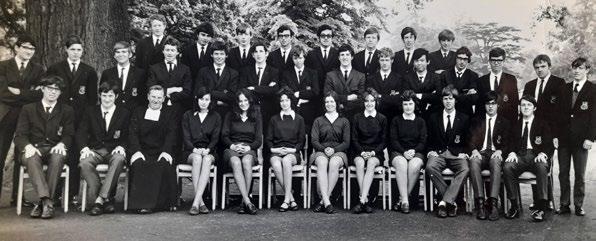
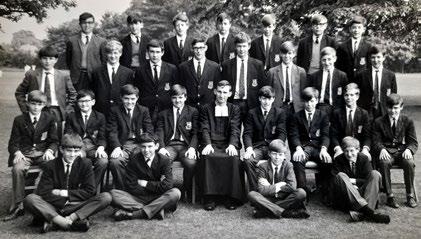

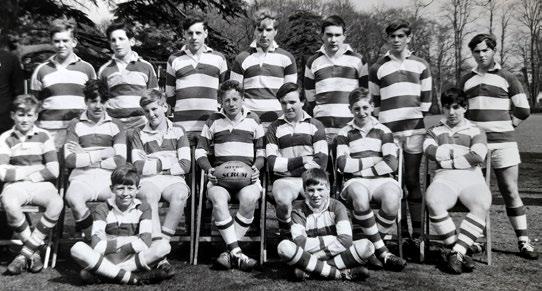

We were delighted to receive a message from Mrs Hayley Swain about her father’s time at the school.
She wrote, ‘My dad, Brendan Carroll, attended St Joseph’s between 1964 and 1971 when it was a Catholic boarding school. He was one of the choristers during his time there and also on the rugby team. He passed away many years ago now, but he often talked of his time there.’
With a visit to Ipswich in the offing, Mrs Swain asked if she could look around the campus and try to spot locations captured in old photographs of her father’s. We said yes, of course!
The visit happened in half-term, when the Swains met the Principal, Mrs Clarke. We were very pleased to be able to hand over some scans of magazines featuring Brendan, including his academic and rugby successes.
Mrs Swain would love to hear from any of her father’s old school friends. Contact obs@stjos.co.uk and we will pass on any emails.

We hope to see as many of you as possible in the year ahead
17-19 OCTOBER
St Joseph’s College
National Schools Rugby Festival
• Friday night OB match and reception
• Two days of top-level sport
• VIP experience
• Tickets on sale in July –stjos.co.uk/rugby-festival/
NOVEMBER (DATE TBC)
London drinks
DECEMBER (DATE TBC)
Christmas Carol Service in the Chapel
THURSDAY MARCH 19
St Joseph’s Day and our 2nd annual Giving Day
FRIDAY MARCH 20
OB Football and Netball Matches
MAY (DATE TBC)
Drinks reunion in the north of England
JUNE (DATE TBC)
OBs v St Jo’s 1st XI
Cricket Match